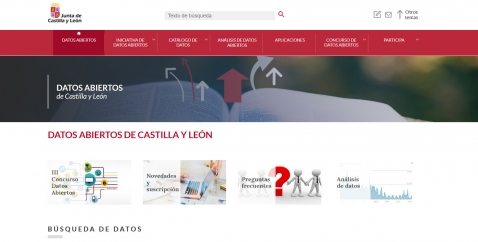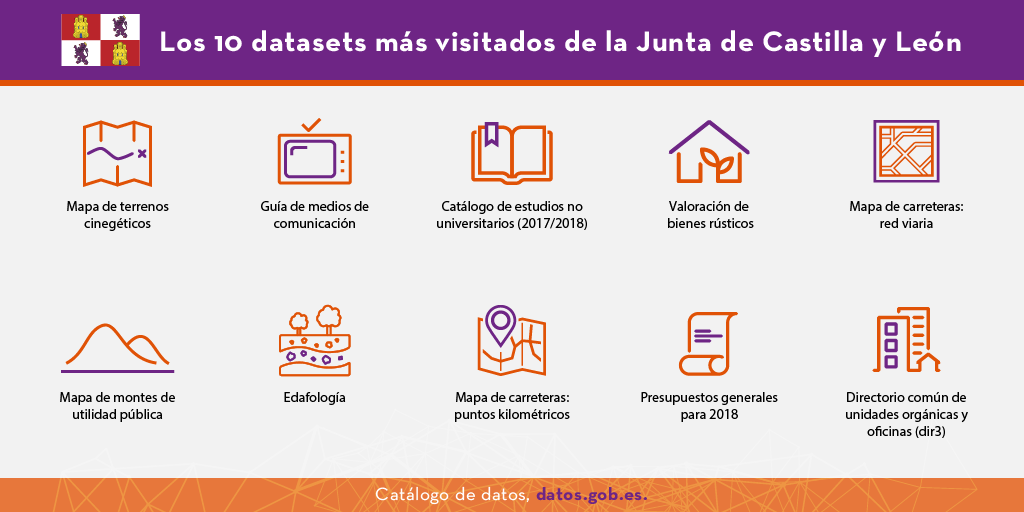Open data of Castilla y León: an initiative in constant growth
Fecha de la noticia: 16-07-2019

When the open data portal of Castilla y León was launched more than 7 years ago, its managers understood that the project had a great potential and, with the passage of time, it would become more important. Since then, they have made a great effort so that the initiative could grow in a sustainable way over time.
Open data as part of the open government strategy
Since its creation, the open data portal was integrated into the Open Government Model of the Castilla y León Regional Government. This mean, without a doubt, an important political drive. But this had to be completed with the work and commitment of the entire organization.
By working transversally with the entire organization, the leadership of the project was assumed by the Corporate Web service, since it had a management experience that facilitated the coordination of the initiative. In this way, it has been possible to promote the publication of new data sets taking advantage of the communication and collaboration channels that already existed for contents publication in web portals. An example is the transparency portal, which have combined efforts and sought synergies.
Main actions lines
- Incorporation of information
One of the main lines of work of the initiative focuses on the incorporation of more information into the catalog. In March 2012, there were 83 initial datasets, which went to 199 in November 2016. It currently has more than 450. 2018 was the year with the largest number of published datasets.

But beyond the number of datasets, the number of records and the usefulness of the information matter. Thus, in recent months, highly demanded information has been published, such as sections with fishing plans, livestock farms and various information on health or energy consumption (with 100.000 rows of data), among other contents.
- Dissemination and awareness
Another important line of work is the dissemination and awareness, both internal and external, being of great importance the training courses, aimed at both publishers and reusers.
In addition to the face-to-face training of the internal (functional and IT) staff, the training on open data is also aimed at other groups such as companies, entrepreneurs, university staff and non-university teaching staff. Especially relevant is the training of the latter group. Making the initiative known to trainers helps them acquire useful digital skills, know the potential of open data and use them in their educational programs to extend knowledge among thousands of students.
Part of this training is done through webminars. This is a very necessary modality in a community as extensive as Castilla y León.
The Open Data Contest is another of its star performances, aimed at measuring the impact and promoting the reuse of public information. With three editions carried out (the last one recently resolved), its dissemination has already served as an advertising campaign for open data. The more than 100 projects that have been presented in total show the wide possibilities offered by Open Data initiatives.
Aligned with the commitment to involve the educational community, the contest also has specific prizes for students and for the development of open didactic resources.
Finally, their commitment to openness has led them to coordinate the Data Reuse Working Group in the Sectoral Committee on Electronic Administration. Currently, work is being undertaken on the analysis of common data sets, the use of vocabularies and the search for commitments to publish datasets by all the autonomous communities. This collaboration between administrations should serve to combine efforts and offer better content and services to reusers.
All these actions have led to the Open Data Initiative of Castilla y León to become a model for the opening of public information. But, as the maturity of the initiative grows, new challenges are also emerging, which are no less exciting:
- Promote internal reuse, through the identification of success stories that show that there is great potential in this regard.
- Exploit data visualizations.
- Continue collaborating with the rest of the national initiatives.
Castilla y León will have to face these challenges without abandoning the focus on the opening of quality data or dissemination and awareness actions that have given such good results.
Content prepared based on the information received by Antonio Ibañez, Jefe de Servicio de la Web Corporativa, Junta de Castilla y León.
Contents and points of view expressed in this publication are the exclusive responsibility of its author.











